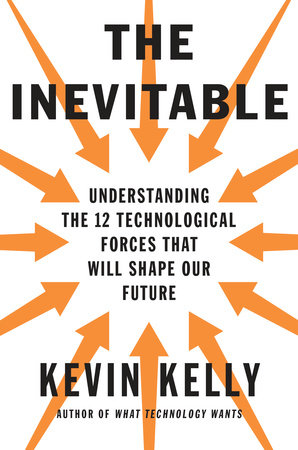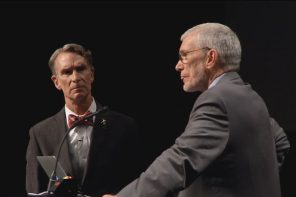Total surveillance, an emergent sharing economy, pervasive networked AI—these are just a few of the technological worlds that Wired co-founder Kevin Kelly predicts for our near future.
In his new book, The Inevitable, Kelly argues that these and other technological changes are inevitable, although he’s careful to name the technological forces guiding these changes as “trajectories, not destinies.” Kelly’s goal is to discover the essences at the heart of our technologies by asking what the technologies themselves want. If we can determine what the technology wants to do, Kelly argues, we can ally with their best uses rather than struggle in our efforts to control them.
A longtime colleague of Whole Earth Catalog founder Stewart Brand, Kelly is a leading thinker in a progressive, near-utopian tech culture that formed during the heyday of the American counterculture. This form of digital culture initially sought to rescue computer technologies from their militant Cold War image and reinstate them as radical tools for the counterculture. Sometimes criticized for technodeterminism, proponents of this philosophy argue that our technologies fundamentally change who we are and who we can become. In 1979, Kelly converted to Christianity while visiting Jerusalem. He often calls on this experience when asked to comment on the ethical dimensions of technological worlds.

The Inevitable: Understanding the 12 Technological Forces That Will Shape Our Future
Kevin Kelly
Penguin Random House, June 2016
Since his tenure as Executive Editor at Wired, Kelly has helped Hollywood imagine the future, attempted to catalogue and identify every living species on Earth, and continued to speak and write prolifically about how humans are caught up in technological systems. Kelly recently spoke with me about God, humanity, and our relationship to technology.
___________
Shannon Schorey: You argue that there are a dozen technological forces that will be “inevitable.” What is it about these technologies that gives them so much agency? Could we stop them if we wanted to?
Kevin Kelly: I think the agency is buried in the actual physics of the technology itself. It is a natural consequence of how these technologies are made. It’s inevitable in the same way that evolution keeps making eyeballs over and over again independently, because it’s a very powerful way to make a sensor. The internet will keep tracking because that tracking is inherently built into the very nature of how information is processed.
I look to see the ways in which the technology wants to be used or is used by people—not how it’s designed to be used, but how actually it is used on the street—as a clue to what it wants, to the ways in which it is naturally biased.
Every system, no matter what it is, has a natural bias in it. I’m looking at that bias to find those things that are going to happen no matter what we do.
You speak of technologies as independent and essentialized forces. Can you tell us more about what technology is? Is there something that makes digital technologies essentially different from, say, a rock used to smash open a door?
I define technology very, very broadly, as anything that is invented, anything that comes from any kind of a mind. So I would actually include a beaver dam as a kind of technology. There’s not much difference between a beaver dam and a human dam. The difference between a rock and a radio is one is invented by a human mind and one’s not.
I have another word, “technium,” which I use to talk about the system of all these technologies together. A spoon or shoe does not really have any lifelike attributes, but all the technology in the world together does. If you have something like your computer mouse or iPhone, there’s ten thousand different other technologies that are required to build it, and each of those thousand technologies may have hundreds of other technologies necessary to build them. That whole network of interdependent technologies forms something that does have a lifelike attribute, the technium.
It’s a system that does have biases and urges like a plant might. In the way the plant wants light, the technium has certain wants as well. The digital internet exhibits many lifelike patterns, even though none of the pieces are living, so I’m looking at it much more from a systems point of view.
You once named media theorist Marshall McLuhan the “patron saint of Wired.” How has he influenced your understanding of technology?
I have to say I have never been able to read very much of McLuhan. I think actually that’s part of…maybe McLuhan’s message was I didn’t need to read him, but I could just hear about him. I’ve tried to read him so many times, and I can’t get very far. I much prefer to read quotes by him. I find him much more accessible that way.
As far as I can tell—and to me his major insight—was this idea that the form of the media was more important than what actually was being said. That idea of examining the consequences of the forms is a very powerful idea for me.
I read McLuhan’s progressive and teleological view of technology as indebted to his Catholicism. Do you see any religion or religious-like ideas as having influenced you?
Yeah, [religion] has certainly influenced me. I definitely see a spiritual dimension to technology. For me, the origins of technology are not this separate sphere that’s independent or isolated from the rest of the cosmos. The origins of technology go back to the Big Bang, the very beginning of the universe. The roots of technology are actually governed by exactly the same dynamic, self-organizing force that made life. It is, in some ways, an extension and acceleration of those forces of life.
Therefore, I place it in a kind of cosmic realm, as being on the same trajectory that other self-organizing forces that we see at work in the galaxy and the universe and life on this planet. Technology is sort of the latest realization of those forces.
I think that, like nature is a reflection of the divine, technology is likewise—and for the same reason. It’s not uncommon for Christian theologians to wrestle with the role of nature and God and man. What’s that kind of stewardship? What’s the position of humans to nature and to God? Nobody, almost, is asking the question, “What’s the relationship of technology to God?” For me, I think that relationship is very similar to the relationship with nature.
You understand our relationship with technology to be one of stewardship?
Yes, that’s our relationship to it. But in terms of to God, what’s technology to God? For me, it’s an outgrowth or an extension, an acceleration of nature, of life, with the added difference of coming via this other free will agent, humans. It’s a derivative form because it’s coming from the natural system of humans, but through their minds and through their free will as well.
I don’t believe that technology is only present on this planet, either. I think in the galaxies there must be millions of planets with technological civilizations that have either preceded us or parallel us.
Is there something unique about a human mind? Or an alien mind? Or a robot mind?
We human scientists don’t have a lot of very good definitions of things like minds or intelligence. For me, a mind is that which produces intelligence, whatever that substrate is, and intelligence is sort of a problem-solving mechanism. It’s a way to come to a solution to a problem.
It’s not a binary thing, meaning that it’s present or not present. I think it’s a continuum. Honestly animals, rodents, rats, mice have a degree of mind, but, we would say, so does a grasshopper. It has a tiny mind. When bees make hexagonal comb, they’re calculating that to some extent. They’re using those little neurons to come to a solution, to solve a problem.
Once you get these neuron circuits, minds are inevitable. That process of making a mind is a very natural thing that will keep occurring wherever there are life systems running long enough.
Your book makes claims about the direction(s) technology will take in the next twenty to thirty years. Do you envision an end point?
No, there is no destiny. There’s no Utopia, there’s no destiny in evolution or in technology. It’s a direction.
The mistaken image people have of evolution is that it’s a ladder and you’re climbing up—that’s totally wrong. The cockroaches and the starfish today have gone through two billion years of evolution just as we have. The map of evolution looks more like a radial hub where there are the initial cells, and then radiating out from them are a million different solutions, a million different ways.
I think the same [is true] with technology. This is not a destiny; there is an ongoing radiation outward. We’re making different species of organisms that biology alone, the wet DNA, could not get to by itself. It invents a mind which then invents ways of surviving not using DNA, not using wet tissue, but other kinds of materials. The mind is a way to settle or inhabit that possibility space that wet DNA could not get to by itself.
What would happen if the mind were wrong? You claim that part of the problem today is that we’re resisting these inevitable technological forces – things like total surveillance and networked AI. But what if we ally ourselves with these technologies based on mistaken assumptions about an essentialized nature of technology?
I could be wrong. I think what’s clear is that first of all, life on this planet is not going to be stopped by humans. It’s impossible. We can kill off certain species, and that would be terrible, but we’re not going to stop life.
Even if we’re gone, I think technology could rise on the planet again. Of course we’re likely to make intelligent beings, and maybe they kill us all (which I think is very, very likely) but they would then invent things. This kind of trajectory would happen whether or not we’re here.
* * *
Also on The Cubit: The tech-Christian apologist who demolished Gawker
Follow The Cubit, RD‘s religion-and-science portal, @TheCubit





